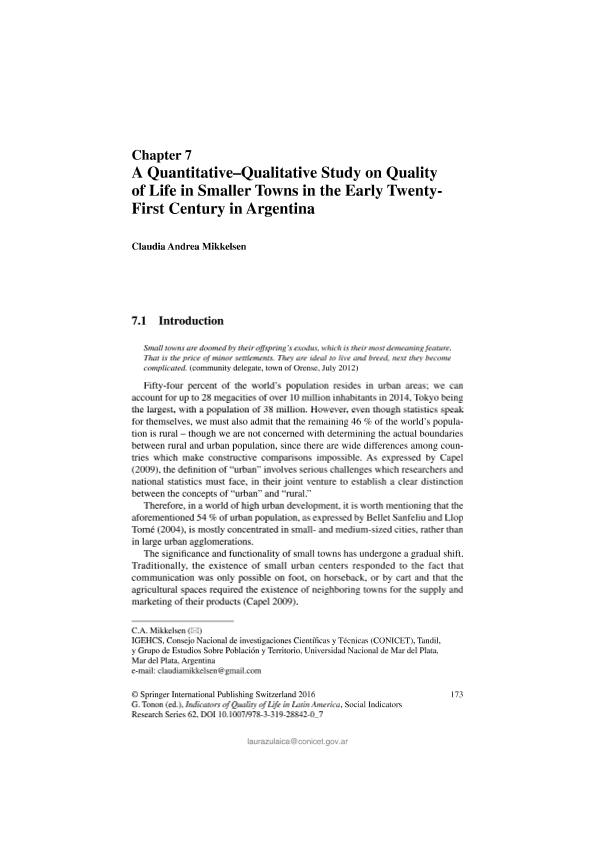Artículo
A Quantitative–Qualitative Study on Quality of Life in Smaller Towns in the Early Twenty-First Century in Argentina
Fecha de publicación:
04/2016
Editorial:
Springer
Revista:
Social Inidcators Research Series.
ISSN:
2215-0099
Idioma:
Inglés
Tipo de recurso:
Artículo publicado
Clasificación temática:
Resumen
The consideration of Quality of Life as a category, allows the study of social welfare and individual and social satisfaction in specific socio-cultural contexts. Quality of life is a sensitive, awareness-raising notion which consists of dimensions and indicators that stimulate reflection upon the ways of achieving a life of fulfillment, for it is sensitive to social, cultural, political, and environmental changes. The aim of this work is to provide information on the quality of life of the population residing in smaller towns in the southeastern suburbs of the province of Buenos Aires, Argentina, within territorial segments undergoing a combination of various processes: repopulation, depopulation, multi-activity, among others.Its approach requires the use of a quantitative and qualitative methodology, so that the data obtained from primary and secondary sources may account for the phenomena under study. Thus censuses and statistics, such as interviews and direct observations, are used to characterize the quality of life of the residents of smaller towns in the southeast of the province of Buenos Aires. And, though their evolution has been dissimilar, it boils down to an almost universally accepted rule according to which, these population groups have subsided into a state of stagnation and undisputable population decline. In this context, it is interesting to reflect on the presence of places whose dynamics can defy this "truth".The period proposed for the analysis comprises the last decades of the XX century and the early XXI century, the period between 1991 and 2001 being defined as the ?convertibility? period, whereas the years to follow ? from 2002 to the present time ? have been identified by specialists as ?neo-development?, in other words, the ?post-convertibility? or ?post-neoliberal? era. After the crisis and devaluation in 2001, the decline of the exchange rate convertibility model led to a new stage known as ?post-convertibility (Varesi 2011; Schorr 2012). Broadly speaking, it may be asserted that, at this stage, the stimulation of production policies of the 90?s was complemented by the consideration of the social dimension, i.e. a greater involvement of the State through the generation of social policies for local governments. In this context, minor towns may attest to the various impacts of different policies through a variety of socio-territorial expressions, such as depopulation, productive diversification and repopulation.Indizada en: Social Science Citation Index, Journal Citation Reports/Social Sciences Edition, SCOPUS, PsycINFO, EconLit, Google Scholar, EBSCO, CSA, ProQuest, CAB International, Academic OneFile, Academic Search, AGRICOLA, Bibliography of Asian Studies, CAB Abstracts, Corporate ResourceNet, CSA Environmental Sciences, Current Contents / Social & Behavioral Sciences, Dietrich's Index Philosophicus, ERIC System Database, ERIH PLUS, Expanded Academic, FRANCIS, Gale, Geobase, Global Health, International Bibliography of Book Reviews (IBR), International Bibliography of Periodical Literature (IBZ), International Bibliography of the Social Sciences (IBSS), JSTOR, OCLC, PASCAL, PSYCLINE, Research Papers in Economics (RePEc), SCImago, Summon by ProQuest
Palabras clave:
Calidad de Vida
,
Localidades Menores
,
Metodologias Cualicuantitativas
Archivos asociados
Licencia
Identificadores
Colecciones
Articulos(CCT - MAR DEL PLATA)
Articulos de CTRO.CIENTIFICO TECNOL.CONICET - MAR DEL PLATA
Articulos de CTRO.CIENTIFICO TECNOL.CONICET - MAR DEL PLATA
Citación
Mikkelsen, Claudia Andrea; A Quantitative–Qualitative Study on Quality of Life in Smaller Towns in the Early Twenty-First Century in Argentina; Springer; Social Inidcators Research Series.; 62; 4-2016; 173-199
Compartir
Altmétricas




